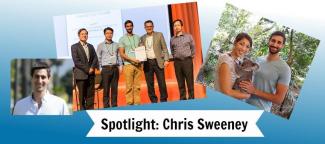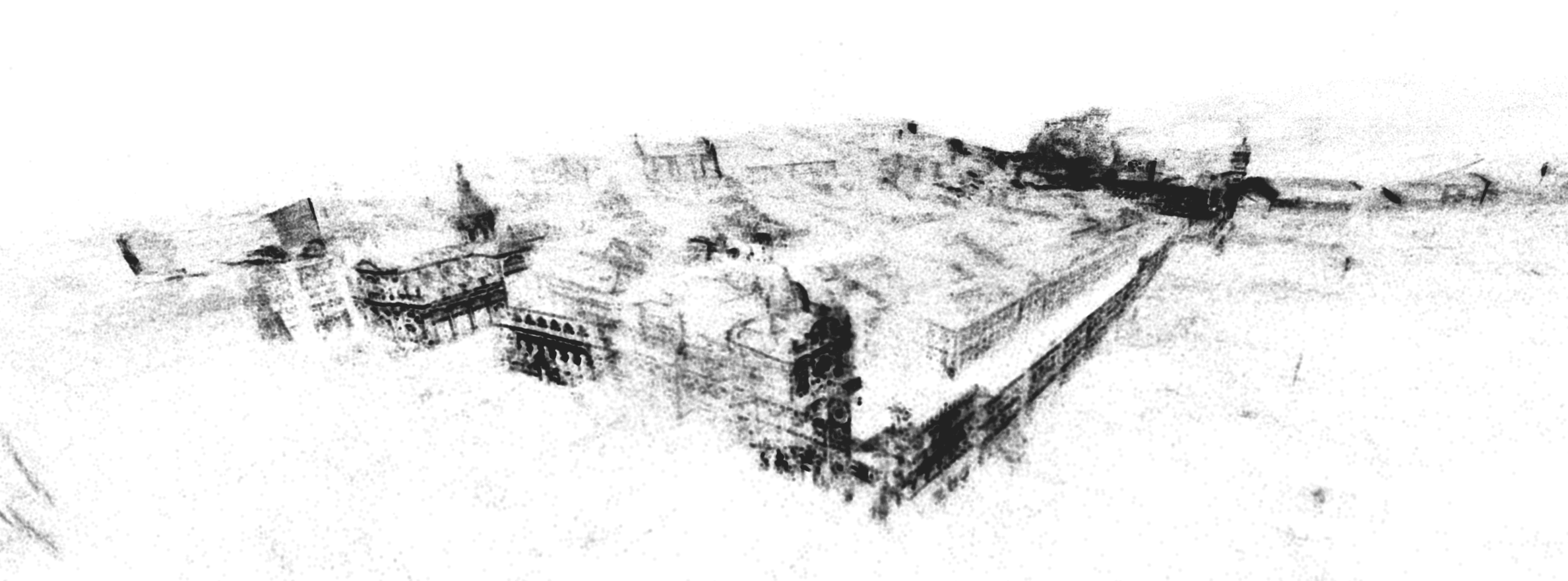Top Stories
Chris Sweeney, a fifth-year Computer Science Ph.D. candidate focusing on Computer Vision, sat down and shared the unique journey of his path to and throughout graduate school. Despite his many academic accomplishments, Chris maintains a well-rounded life.

 Chris Sweeney, a fifth-year Computer Science Ph.D. candidate focusing on Computer Vision, sat down and shared the unique journey of his path to and throughout graduate school. Despite his many academic accomplishments (including receiving top honors at the Association for Computing Machinery Multimedia Open-Source Software Competition in Australia last October), Chris maintains a well-rounded life. When he's not in the Four Eyes Lab, he can be found performing with the local Santa Barbara Improv Group, swimming, or volunteering his time in local and international communities.
Chris Sweeney, a fifth-year Computer Science Ph.D. candidate focusing on Computer Vision, sat down and shared the unique journey of his path to and throughout graduate school. Despite his many academic accomplishments (including receiving top honors at the Association for Computing Machinery Multimedia Open-Source Software Competition in Australia last October), Chris maintains a well-rounded life. When he's not in the Four Eyes Lab, he can be found performing with the local Santa Barbara Improv Group, swimming, or volunteering his time in local and international communities.
 Where did you grow up? Tell us a little about your family, childhood, and early education.
Where did you grow up? Tell us a little about your family, childhood, and early education.
I grew up in Northern Virginia, near D.C. I attended Thomas Jefferson High School for Science and Technology in Alexandria, where I began my love of computer science. I went to college at the University of Virginia, where I received a B.S. in Math and Computer Science. As an undergrad, I always knew what I wanted to study, and I've been following that path since then.
 Tell us a little about your research and how you came to choose the topic.
Tell us a little about your research and how you came to choose the topic.
I'm working in data visualization and computer vision. Specifically, I'm looking at 3D geometry from images for programs like CAD. This came by way of undergraduate research I participated in: large-scale image processing. As a Ph.D. student, I'm working on making large-scale Structure from Motion more accessible by developing 3D modeling software and sharing it on my software's website. Some examples of models I've made with my software are pictured here.
 To create these 3D models, I have a script that crawls Flickr for landmarks (i.e., the most heavily photographed places in the world), then I take the images and run them through my software to recover full 3D models of the scenes.
To create these 3D models, I have a script that crawls Flickr for landmarks (i.e., the most heavily photographed places in the world), then I take the images and run them through my software to recover full 3D models of the scenes.
What has graduate student life been like for you?
It's been very rewarding. I've had several travel opportunities and internships. I've had three internships for Google Goggles, and from September 2014 through April 2015, I was a visiting student at ETH Zurich [Swiss Federal Institute of Technology] in Switzerland. I've also enjoyed meeting cool people from these experiences.
What do you wish you had known before you started grad school?
Funding can be a real struggle!
Name an accomplishment you are most proud of and why.
 I'm having a hard time choosing between two big accomplishments: winning my Open-Source award, and my time as a visiting student to ETH Zurich. The Open-Source Software competition is sponsored by the Association of Computing Machinery, and my Theia Open Source Library for 3D Modeling won first place this past fall. I'm proud of this award, as it's a validation of both my own hard work and the general community's commitment and contributions to open source.
I'm having a hard time choosing between two big accomplishments: winning my Open-Source award, and my time as a visiting student to ETH Zurich. The Open-Source Software competition is sponsored by the Association of Computing Machinery, and my Theia Open Source Library for 3D Modeling won first place this past fall. I'm proud of this award, as it's a validation of both my own hard work and the general community's commitment and contributions to open source.
Secondly, being a visiting student to ETH Zurich was incredible. Professionally, it was really neat to be invited to the top labs there. Personally, it was a challenge to be in a country whose language was German. Although the working language of the labs was English, I had to improve my German language skills to get by day-to-day.
What has been a source of motivation or drive for you in your graduate studies?
I'm very self-motivated, which has helped me accomplish a lot during school. It also helps that I'm in an industry that's currently seeing a boom, and many digital imaging ideas are now becoming tangible products.
 What do you do to relax? Any hobbies, favorite places to go, favorite things to do?
What do you do to relax? Any hobbies, favorite places to go, favorite things to do?
Some of my favorite hobbies include wine tasting along the Central Coast, playing soccer, and woodworking. So far, I've made desks and tables. I also like to travel, which is a benefit of grad school and the industry, since there are so many international and regional conferences.
Have you taken any other interesting international trips?
In college, I participated in Alternative Spring Breaks in Jamaica and the Dominican Republic. These were weeklong service trips in which we volunteered with local elementary schools. More recently, I traveled to Tamale, Ghana, with Community Water Solutions [now Saha Global]. Our team built a water purification center in town and taught local women how to run the facility and about sustainable leadership. We encouraged the women to charge a nominal fee for their work, which helped improve their economic standing.
What is one thing people would be surprised to know about you?
I come from a big family - I'm one of five kids. I feel that families aren't usually that big anymore, especially on the West Coast. People are usually surprised to hear how many siblings I have.
What do you hope to be doing 5 or 10 years out of graduate school?
For a while, I'd hoped to stay in academia, ultimately as a tenured professor. However, recently I've felt a growing potential toward working for a tech company. I could see myself doing R&D work, for the right company. I'm starting my postdoc work in January at the University of Washington, so I'll see where that takes me down the road.
Do you have any advice for current grad students?
Be open to talking about any problems you may be facing - whether it's financial, research, or life in general. It's important to communicate openly with your advisors, colleagues, and other faculty members.